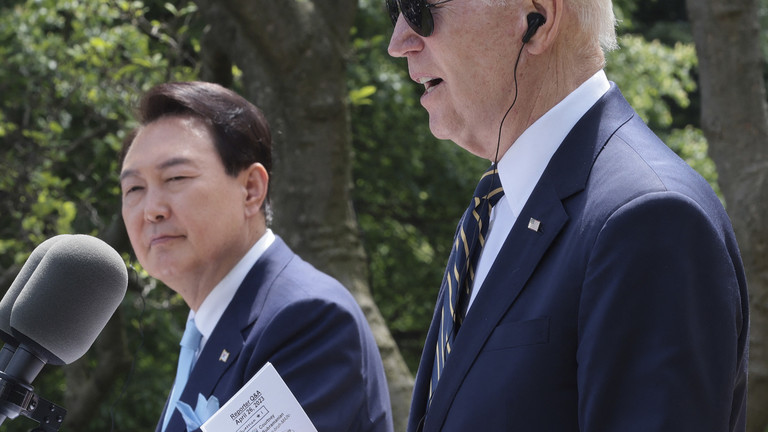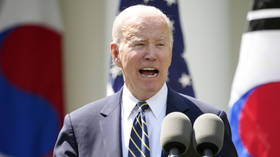President Yoon Suk-yeol is antagonising North Korea, China, and Russia, putting his own country in jeopardy for Washington’s benefit

On Wednesday, South Korean President Yoon Suk-yeol arrived in Washington for an official state visit. The visit has come complete with an announcement that the US will be sending nuclear-armed submarines to South Korea.
Yoon has sought to pivot his foreign policy back towards the US while dismantling the much more moderate approach of his predecessor, Moon Jae-in, who sought to pursue peace with North Korea, as well as hold productive relationships with China and Russia.
Now, Yoon has not only sold his country out to Japan amidst Washington’s demands, attempting to shelve the controversial historical dispute over forced labour during Tokyo’s colonial rule over the country in 1910-1945, but he is also pursuing reckless antagonism with Pyongyang, Moscow, and Beijing, even while the US dismantles the foundations of South Korea’s economic success with its discriminatory policies against Korean industries in the form of the Inflation Reduction Act and its war on the semiconductor sector.
All these policies risk transforming the Korean peninsula into a new cold war battleground and reversing decades of progress.
The entry of the conservative Yoon Suk-yeol into office, combined with the ultra-belligerent Biden administration, has served to dismantle the fragile attempts at peace on the Korean peninsula made by Donald Trump, and Moon Jae-in, as unsuccessful as they may have been.
While Trump and Moon sought to meet with North Korean leader Kim Jong-un, hold talks and alleviate tensions, their successors show no interest in doing so and have sought to reignite an arms race on the peninsula by holding massive military exercises, met in turn with increased ballistic missile testing by Pyongyang.
It is in the fundamental interest of the US neoconservative elite to block such efforts towards peace, and such is one reason Trump failed.
Because if the two Koreas are able to reconcile, America’s military presence on the peninsula is at least partially delegitimized, and therefore Washington’s ability to use South Korea, as well as the wider region of Asia, as a bulwark to contain China, is compromised.
It is strategically unfavourable to promote peace, just like the US refuses to do so in Ukraine.
However, if the US – backed by its anti-communist allies among South Korea’s conservatives – can keep the peninsula under a constant state of military tension, continually provoking the North into a long-term arms race, these objectives can be fulfilled.
But, across the board, the consequences of this will be disastrous, taking the Korean peninsula to a level of nuclear tensions not even seen during the Cold War.
Although much rhetoric has been floated that the US can “end” the North Korean regime should it pursue a nuclear attack, it is naïve to make such sweeping assumptions, or to dismiss the reality that in this scenario all Koreans, including in the South, would be the biggest losers.
Irrespectively, North Korea is not a country to call bluff on and while it regularly pursues threatening rhetoric and hyperbole, recent history shows it has been more than willing to use force to punish South Korea, such as, for example, by sinking a warship or shelling an island.
In addition to this, Yoon has also made the decision to increasingly antagonise China at Washington’s behest, having made provocative comments about Taiwan and then summoned the Chinese ambassador when Beijing responded.
On an economic level, this is reckless, as China is the country’s largest trading partner. South Korea’s past efforts at antagonising Beijing, such as through the deployment of the THAAD missile defence system in 2017, ended with sanctions against the country.
The US does not present an equivalent economic alternative, because of its highly protectionist economic policies, its demand that South Korean semiconductor companies build capacity on American soil, as well as the Inflation Reduction Act harming the trade balance for the South.
It has been questioned even by the most ardent pro-US commentators what exactly Yoon is getting from his US visit.
The answer is nothing. He has premised his entire foreign policy on wilful subservience, to the point of undermining the security, stability, and prosperity of the Korean peninsula. It is little surprise that his approval rating keeps slipping.
Increasing tensions with three countries simultaneously, at a time when neither Moscow nor Beijing have any interest in restraining Pyongyang, will unleash chaos throughout the region, as Kim Jong-un responds with more missile tests and perhaps even a nuclear test.
South Korea stands to be the biggest loser in the situation, while Washington reaps strategic benefits. Again, we see willing proxies sacrifice their countries by provoking conflicts for the US to use to project its power.
The problem is, Pyongyang has far less restraint than either Moscow or Beijing, because it is fighting for its fundamental existence against the US. Nuclear war isn’t a game for Kim, but for the Biden administration it seems to be.
By Timur Fomenko
Published by Rt.com
Published by The 21st Century
The views expressed in this article are solely those of the author and do not necessarily reflect the opinions of 21cir.com


